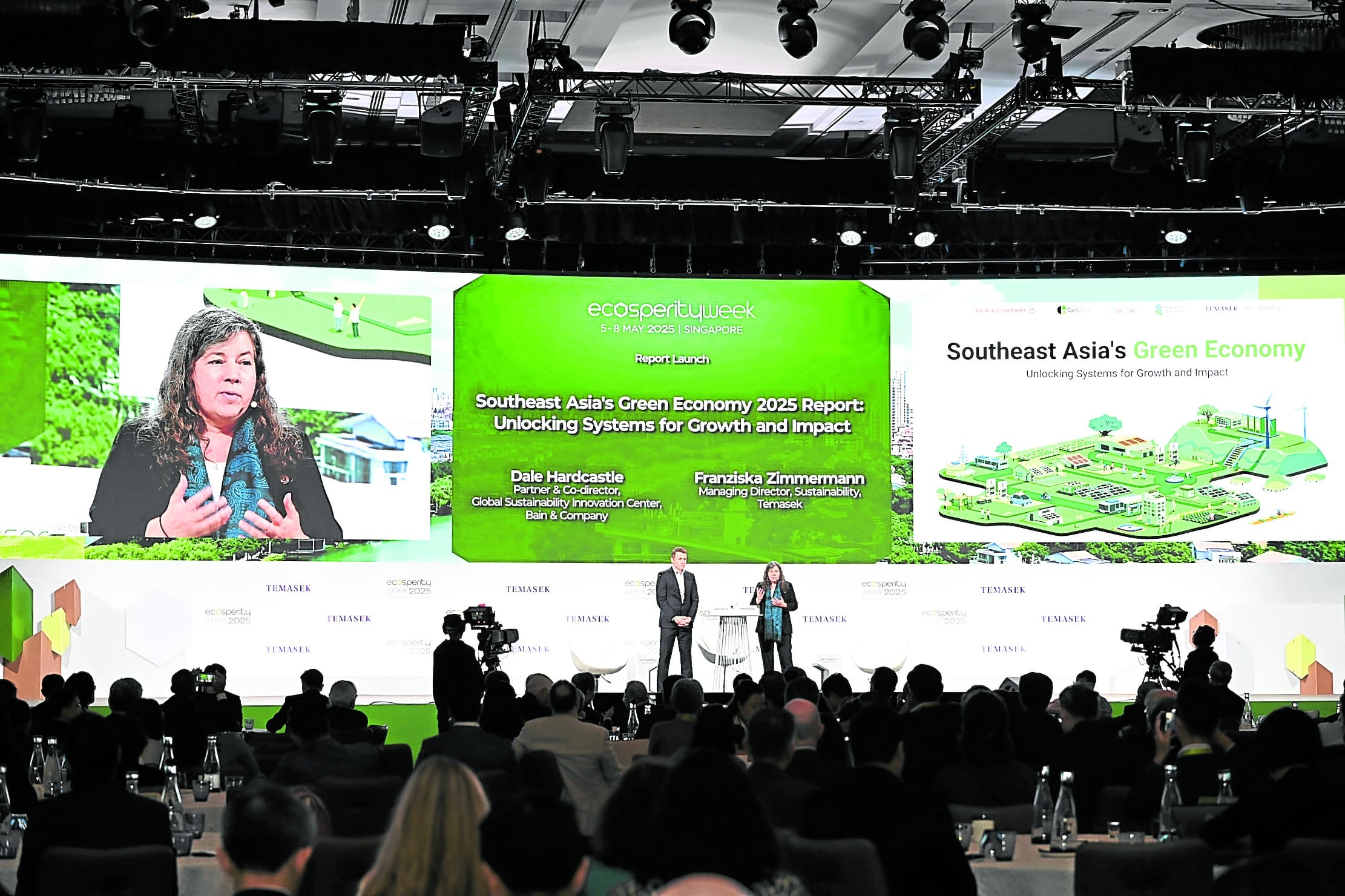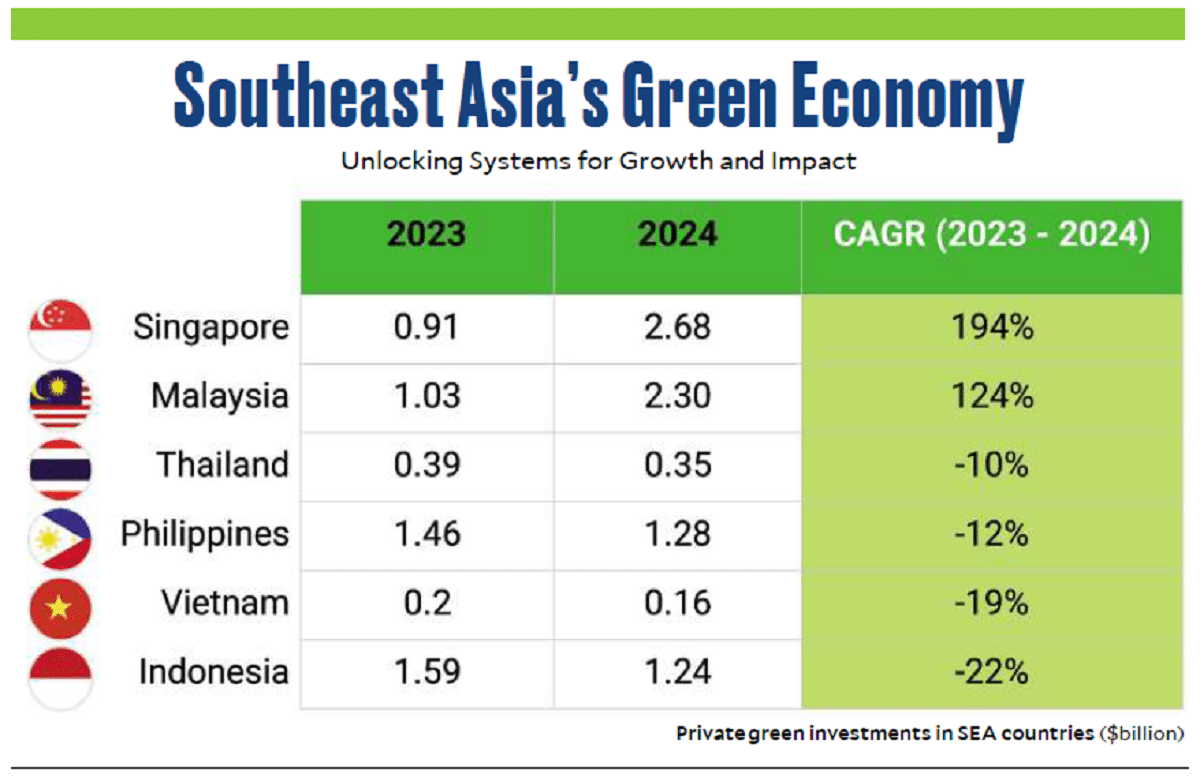
RACE TO NET ZERO Franziska Zimmermann, managing director for sustainability, Temasek and Dale Hardcastle, accomplice & co-director, International Sustainability Innovation Heart, Bain &Firm, on the launch of the SE Asia Inexperienced Financial system Report throughout Ecosperity Week 2025 in Singapore. —CONTRIBUTED PHOTO
MANILA, Philippines — The Philippines noticed a decline within the quantity and worth of private-sector investments within the “inexperienced” economic system sector in 2024, placing the nation additional away from reaching its 2030 decarbonization objectives.
In accordance with the “Southeast Asia’s Inexperienced Financial system: Unlocking Methods for Progress and Impression” report produced by Bain & Firm, GenZero, Google, Commonplace Chartered and Temasek, the variety of “inexperienced” offers dropped to 11 in 2024 from 15 in 2023, with the mixed funding worth likewise declining 12 p.c to $1.282 billion from $1.464 billion the 12 months prior.
The overwhelming majority of the investments final 12 months went into photo voltaic initiatives, with wind offers a distant second, adopted by different renewable power initiatives, together with hydro and geothermal power. Reductions, nevertheless, have been seen in waste administration and inexperienced cement sectors.
The report underscores that photo voltaic investments grew 1.5 occasions prior to now 12 months whereas wind power initiatives surged six occasions. Alternatively, investments in waste administration dropped considerably, from $600 million in 2023 to none in 2024.
However even with the decline in whole investments final 12 months, the Philippines accounted for 16 p.c of the full non-public “inexperienced” investments that went into the area, the third highest after Singapore with 33 p.c and Malaysia with 29 p.c.
Middling within the area
Vietnam, however, cornered simply 2 p.c of the full “inexperienced” investments in 2024, whereas Thailand secured $355 million in investments, which is equal to 4 p.c of the full, in keeping with the sixth version of the Southeast Asia Inexperienced Financial system Report that was launched through the current Ecosperity Week that Temasek organized.
Indonesia rounded up the record of six Southeast Asian nations within the report, attracting $1.241 billion or 15 p.c of the “inexperienced” investments that went into these member nations of the Affiliation of Southeast Asian Nations.
That the Philippines recorded a decline in investments will be attributed to the excessive inflationary setting and the elevated rates of interest that precipitated traders to grow to be extra risk-averse, a state of affairs that was additionally seen in different nations within the area.
Certainly, solely Singapore and Malaysia noticed a big enhance in “inexperienced” investments in 2024, with the Philippines, Thailand, Indonesia and Vietnam all registering year-on-year declines.
Anshari Rahman, Director of Coverage and Analytics at GenZero, a Temasek-founded funding platform centered on accelerating decarbonization, acknowledges that staying on track towards reaching net-zero local weather objectives has grow to be “more and more troublesome amid instant challenges like inflation and power safety.”
However on the similar time, Rahman warns that “shedding sight of the local weather disaster dangers far higher long-term penalties.”
Threat aversion
Thankfully, whereas there was a basic decline in authorities investments, the non-public sector has been selecting up a number of the slack, though nonetheless far in need of supreme.
The report signifies that on the entire, companies within the area confirmed a rise in setting targets and creating highway maps towards reaching local weather objectives, primarily to realize web zero—to seize as a lot carbon as what’s emitted—by 2030.
“Inexperienced investments nonetheless lag,” the report factors out.
Altogether, investments rose by 33 p.c to $8 billion in 2024 from $6 billion the 12 months earlier than, however this was not sufficient as “all SEA (Southeast Asian) nations proceed to have a big hole between required vs. precise funding.”
For the Philippines, the report signifies year-on-year enhancements in its infrastructure and know-how metrics, from “unlikely on monitor to ship goal” in 2023 to “probably on monitor to ship goal” in 2024.
That is primarily as a result of higher energy grid interconnectedness and the supply of extra charging stations for electrical automobiles.
Dale Hardcastle, accomplice for Asia-Pacific at consulting agency Bain & Firm and one of many authors of the report, underscores the pressing want within the area for “daring, coordinated motion” to fulfill its 2030 local weather objectives to avert the worst impacts of the local weather disaster.
“Southeast Asia (SEA) stands at a pivotal juncture in its inexperienced transition. Over the previous decade, the area has demonstrated rising ambition, heightened consciousness, and early decisive steps towards sustainable improvement. But, progress has been uneven,” he says.
“And with solely 5 years remaining to fulfill the crucial 2030 local weather targets, [Southeast Asia] will not be but on monitor to satisfy its local weather pledges. The chance to change this trajectory is narrowing quickly,” Hardcastle provides.
Name to ramp up
Thus, Hadcastle and Franziska Zimmermann, managing director for sustainability at Temasek, stress that the time has come to “speed up” inexperienced transition in Southeast Asia, which is estimated to be the world’s fourth-largest power client, with demand growing by 3 p.c of the 12 months alongside financial and inhabitants progress.
“We’re at a crucial juncture in our world battle in opposition to local weather change. With simply 5 years till 2030, the window to avert the worst impacts of the local weather disaster is closing quickly,” she says.
“The previous two years have been the most well liked on file, with world temperatures breaching 1.5 Celsius above pre-industrial ranges for the primary time. On the similar time, the worldwide sustainability motion is going through its strongest headwinds—political pushback, protectionist insurance policies, rising anti-ESG sentiment, and companies reassessing local weather objectives,” Zimmermann provides.
Thus the decision is to keep up the momentum, particularly in Southeast Asia, which will be the middle of “inexperienced” progress that may meet the emissions purpose whereas creating financial progress and jobs.
“The trail ahead will not be simple, however the potential rewards are immense,” Zimmermann stresses.


